Letters from Geneva: EFG International's COO Mark Bagnall
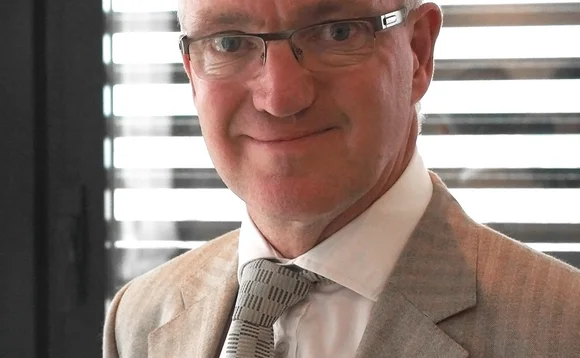
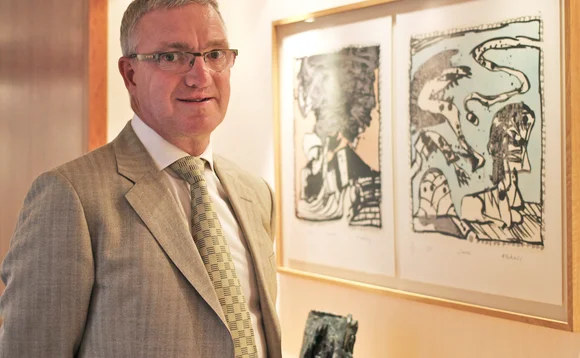
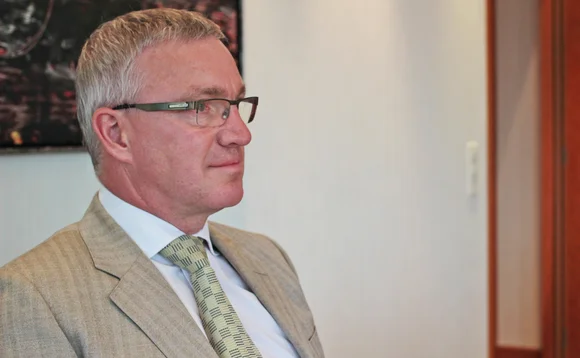
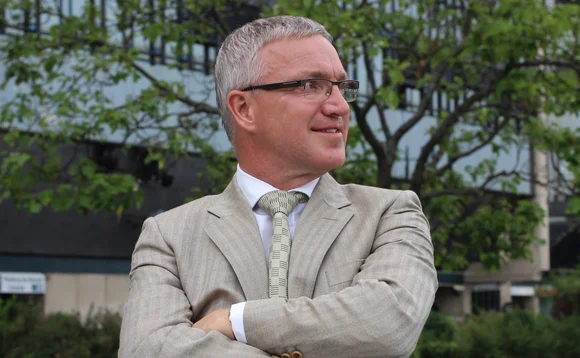

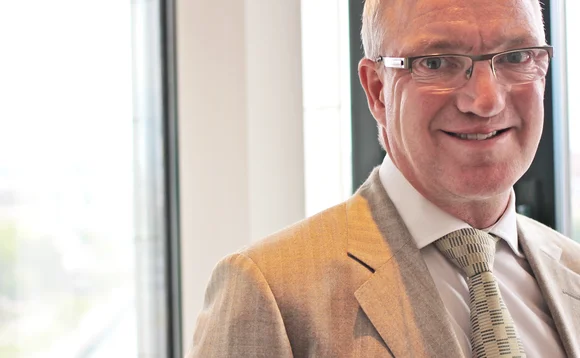
Across from EFG International’s offices in Geneva is the Barrage de Seujet, a series of three locks spanning the Rhone River as it runs eastward toward Lake Geneva, about a mile away. In a city otherwise known for its elegance and international diplomacy, the hulking, steel locks are an industrial peculiarity. But they once served a vital urban role—with an adjacent water works, they provided early electricity generation—and remain the primary way for the surrounding canton (Swiss province) to maintain the lake’s water level. They aren’t particularly well adorned—quite the opposite—but they do the job.
Like the locks at the bank’s doorstep, the main purpose of EFG’s technology platform is to regulate flow—that of its client assets as they dart across the world and, increasingly, must navigate declaration, monitoring, and government scrutiny in the process. As one of the youngest among its brethren—Zurich-based EFG was founded in 1995—the private banking and asset management group with CHF78.7 billion ($86 billion) under management succeeds by being nimble, rather than pushing a 300-year-old name or lavish offices paneled in mahogany. While technology executives’ responsibilities have expanded throughout the private wealth management space, this is uniquely—and purposively—the case at EFG. After all, the firm’s one-time CTO, Mark Bagnall, today leads the entirety of its operations as COO.
Transitions
Graduating from the University of Liverpool, Bagnall first worked as a programmer for British Petroleum (BP), before cutting his teeth in the City of London coding the production environment for a back-office system at JPMorgan. His career pivoted toward management when Merrill Lynch hired him in a push for pan-European and global equities middle-office platform integration. “We had spare capacity there as a result of acquisitions, and around 2001, decided to found a securities services division, one of the earliest of its kind, for clearing, custody, and prime brokerage, for which I served as European CTO,” he says. “I was very passionate about that idea, and it was typical for Merrill. They were very aggressive followers: When someone would get into a market quickly, they weren’t far behind.”
After leading a second special project—a two-year joint effort with Microsoft, whereby Merrill would be the first universal bank to implement the software giant’s still relatively unknown SQL servers enterprise-wise—Bagnall made the jump to Switzerland. “A lot of people think the switch from BP to finance was a big one, but moving from equities to ultimately running Merrill’s International Wealth Management (IWM) IT was actually a bigger transition,” he says. “Capital markets are about vertical scale, efficiency, and speed, where a small delta of improvement can have a massive impact—if it scales. On the private banking side, it’s more about horizontal complexity. Rather than worrying about how you get from 50,000 to a million rapidly, you’re wondering how to process a diverse set of products, and present them as a single portfolio to a client.”
The early years in Geneva were also a lesson in international politics. “For Merrill Private Client, I was running everything outside the US,” he says. “This was an enormous organization, with thousands of technologists globally; it was mostly about US dollar, US product. But I was responsible for 11 international booking centers. On that side of it, very different personalities were involved, and all of the exotic flow and structures were mine to deal with. In 2003, I got a call from our global head of technology with a data project related to the War on Terror examining all of Merrill’s client names, asking that ours be shipped over. Given Swiss law, it took some explaining as to why we couldn’t do that. Certain things are different now than then, but here you learn to live with a little bullying—it was terror before, now it’s tax.”
In a globalized world with an international clientele, when, at the same time national jurisdictions are pushing toward as much onshore declaration as possible, serving a complex, high-net-worth family without breaching an emerging rule is really difficult to do.
‘Two Weeks’ Dating’
Merrill’s IWM practice grew significantly—especially in Asia, where Bagnall spent a fair amount of time—throughout the mid-2000s, so much so that its IT function was split into two regions a couple of years before the firm began to teeter, and was eventually sold to Bank of America in the run-up to the 2008 financial crisis. Having left the firm in August of that year, and ready to return to London to take over Deutsche Bank’s transaction services unit, Bagnall was wistfully packing things up at his flat in his adopted Swiss home, taking a few weeks to get settled before starting the new role. The next day, EFG called. The sound of the CTO role the bank offered was just too good to ignore.
“I was fortunate in that I had somewhere to go, when, during that period of turmoil, lots of people didn’t. But the Deutsche position always felt a bit sideways,” Bagnall says. “EFG found me, and we agreed to a consultancy at first, essentially a deep-dive review of technology at the bank. It was like two weeks of dating, which just happened to prove the perfect fit.”
Reflecting the wishes of its founders, Lawrence Howell and Jean-Pierre Cuoni, a veteran of Citi and Coutts in London, EFG has attempted to revive the lost art of “total wealth management” in a way that other top private banks, especially those aligned with major financial institutions, have not, or cannot. Beginning with only a few key accounts and a license to legally operate in Zurich purchased from Royal Bank of Scotland, the group’s activities now range from its emphasis in traditional private banking to alternative investments, specialized legal and offshore solutions, as well as a US brokerage arm, EFG Capital. To manage that large sell-side diversity at a firm of only 2,200, Bagnall says continuity is key.
“I knew what I liked about Merrill was the enterprising spirit, but what I hated is that universal banks are entirely cyclical, either hugely investing or hugely cutting back, and often can’t stick to a strategy for more than a year. EFG is much smaller, much younger, and there is nowhere to hide,” Bagnall says.
“At first, that can be bloody scary,” he says. “A big challenge for Swiss banks is the risk of data theft, for example. No one can be certain theirs hasn’t been stolen; there are a thousand ways it can be done. At Merrill, there was an army of people in New Jersey for me to outsource that problem to, just by sending the right memos. Not here. Nine out of 10 times, though, I find that empowering. Our founders are, in many ways, brilliant men, and consummate private bankers. But they knew little about technology, so the proposition was simple. I run IT, and that’s it.”
Location, Location … Regulation
Run it he has—until 2010 when Bagnall joined EFG’s executive committee as COO. If private banking seems mysterious in the popular imagination, its technology, according to Bagnall, is not. His team of about 200 IT staff—another 200 reside in operations—and EFG’s CHF50 million technology budget have remained remarkably consistent since 2008, and focus on three areas: new accounts opening; maintaining the group’s 13 booking centers that range from Cayman and Miami to the Channel Islands and Singapore; and managing a handful of global core application licenses—Temenos T24, among others—which Bagnall credits his predecessor, Ian Cookson, with establishing. Still, how each of those is managed is conditioned on uncertainty.
“Thirty to 40 percent of my time is spent with our committee, figuring out how we are going to respond to our changing industry, with regulation absolutely in the front. In a globalized world with an international clientele, when, at the same time national jurisdictions are pushing toward as much onshore declaration as possible, serving a complex, high-net-worth family without breaching an emerging rule is really difficult to do,” Bagnall says. “The struggle for private banks is that no sensible firm can afford to be in breach—but get too conservative and you’ll have no clients to on-board. There is a huge gray area in terms of transactions you’re willing to do, especially cross-border, and it’s all judgment based. My role is to provide the technology to allow us to work in that gray area.”
Identifying and vetting potential “compliant” clients using know your client (KYC) analytics is one capability Bagnall has built up; another is honing the firm’s accounting engines. “Business cases expanding to new booking centers are often quite optimistic on scale and reuse of platforms, but this is one illustration of how subtle that challenge actually is,” he says. “Most European jurisdictions use average cost, whereas in the US you have tax lots, so those engines need to configure totally differently. On the business side, it is the same reason we won’t compete with a French universal bank in the mass affluent segment, for example—they can leverage a retail scale. If things get more bespoke and complex, covering multiple assets or currencies, that is the space where we like to work.”
Being a specialist isn’t easy unless you manage the day-to-day functions as well as, or better than, the big guys do. Tightening up the enterprise—from production to line management and operations support—is why Bagnall believes he’s COO, although he often does so wearing a CTO’s hat.
“Typically, private banking clients don’t differentiate on the front-end portal,” he says, although he acknowledges that this is slowly changing with a greater share of new, younger clients. “They still value investment performance, confidentiality, and trust in ability to cope with jurisdictional complexity above all. Our 13 booking databases are all implemented first at our datacenter in Switzerland, which means throughout the organization, as batches are completed and portfolio valuations produced through our booking centers across time zones, there is only one version of the source code. We don’t change application architecture every two years— sure, that isn’t very sexy, but it creates a very mature understanding of the systems we run that I think is highly effective.”
Element of Bias
A preference for surety doesn’t mean Bagnall won’t consider radical alternatives—the case just has to be a strong one. The COO says a more decentralized IT presence is probably inevitable, but he refuses to jump the gun just yet. “We looked at doing more elsewhere, especially in Asia because of our clients there and in theory it would be cheaper, migrating our hub to either Singapore or Hong Kong. But we found if you want quality technology people, they cost virtually the same there as they do in Geneva. It may make sense in the future, but today, the business case just doesn’t stack up.”
For now, the bank is happy enough to take a steady course as the landscape continues to shift around it—indeed, Bagnall is intrigued to see how last year’s sale of his old employer—Merrill’s IWM—by Bank of America to Julius Baer, pans out. “At first, I thought Baer were crazy, but they were very smart during the due diligence phase in the way they structured the deal,” he says.
Meanwhile, EFG—which once performed more than 80 percent of its bookings domestically a decade ago—now distributes them across its multiple geographic regions almost evenly. “That’s something we did right, fundamentally,” Bagnall says. “With private banking, no one knows the end-game yet. Is Switzerland dying? Will one of the Asian jurisdictions become truly dominant? Operationally, I doubt we’ll ever be de minimis in Switzerland, but we’re well hedged today because wherever that answer lands, we’re already there.”
As for more of finance’s CTOs taking on the operations chief’s role, Bagnall’s opinion is an honest one. “Running operations in our age, IT has to be at the heart of it. As COO, 60 percent of the opportunity I see is in technology—even at a private bank. But I suppose there is an element of bias in that response,” the former programmer says, smiling.
Only users who have a paid subscription or are part of a corporate subscription are able to print or copy content.
To access these options, along with all other subscription benefits, please contact info@waterstechnology.com or view our subscription options here: http://subscriptions.waterstechnology.com/subscribe
You are currently unable to print this content. Please contact info@waterstechnology.com to find out more.
You are currently unable to copy this content. Please contact info@waterstechnology.com to find out more.
Copyright Infopro Digital Limited. All rights reserved.
As outlined in our terms and conditions, https://www.infopro-digital.com/terms-and-conditions/subscriptions/ (point 2.4), printing is limited to a single copy.
If you would like to purchase additional rights please email info@waterstechnology.com
Copyright Infopro Digital Limited. All rights reserved.
You may share this content using our article tools. As outlined in our terms and conditions, https://www.infopro-digital.com/terms-and-conditions/subscriptions/ (clause 2.4), an Authorised User may only make one copy of the materials for their own personal use. You must also comply with the restrictions in clause 2.5.
If you would like to purchase additional rights please email info@waterstechnology.com
More on Emerging Technologies
Waters Wavelength Ep. 313: FIS Global’s Jon Hodges
This week, Jon Hodges, head of trading and asset services for Apac at FIS Global, joins the podcast to talk about how firms in Asia-Pacific approach AI and data.
Project Condor: Inside the data exercise expanding Man Group’s universe
Voice of the CTO: The investment management firm is strategically restructuring its data and trading architecture.
BNP Paribas explores GenAI for securities services business
The bank recently released a new web app for its client portal to modernize its tech stack.
Bank of America and AI, exchanges feud with researchers, a potential EU tax on US tech, and more
The Waters Cooler: Broadridge settles repos in real time, Market Structure Partners strikes back at European exchanges, and a scandal unfolds in Boston in this week’s news roundup.
Bloomberg rolls out GenAI-powered Document Insights
The data giant’s newest generative AI tool allows analysts to query documents using a natural-language interface.
Tape bids, algorithmic trading, tariffs fallout and more
The Waters Cooler: Bloomberg integrates events data, SimCorp and TSImagine help out asset managers, and Big xyt makes good on its consolidated tape bid in this week’s news roundup.
DeepSeek success spurs banks to consider do-it-yourself AI
Chinese LLM resets price tag for in-house systems—and could also nudge banks towards open-source models.
Standard Chartered goes from spectator to player in digital asset game
The bank’s digital assets custody offering is underpinned by an open API and modular infrastructure, allowing it to potentially add a secondary back-end system provider.







